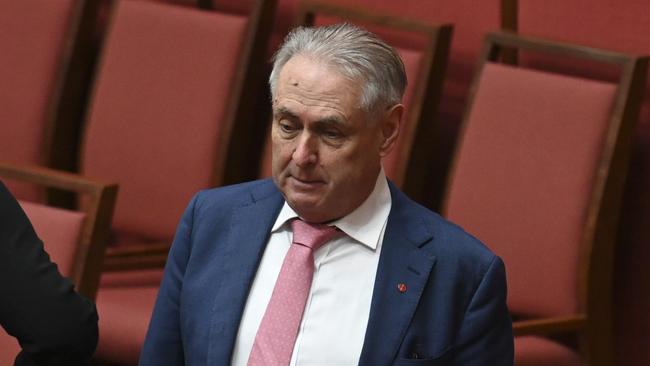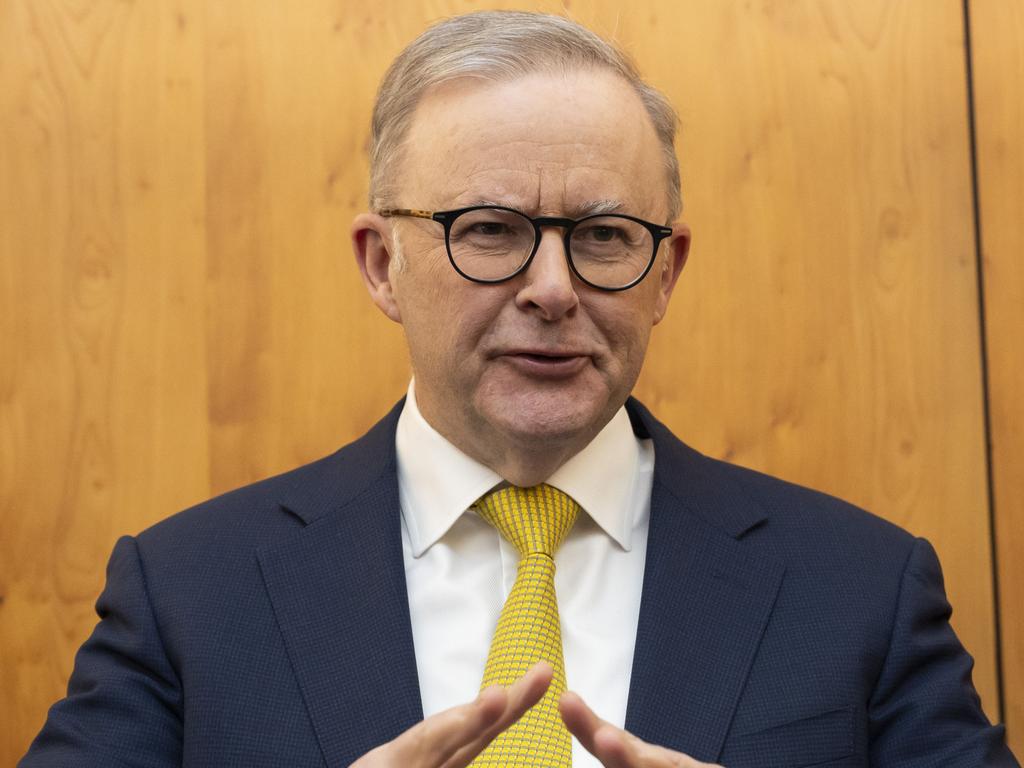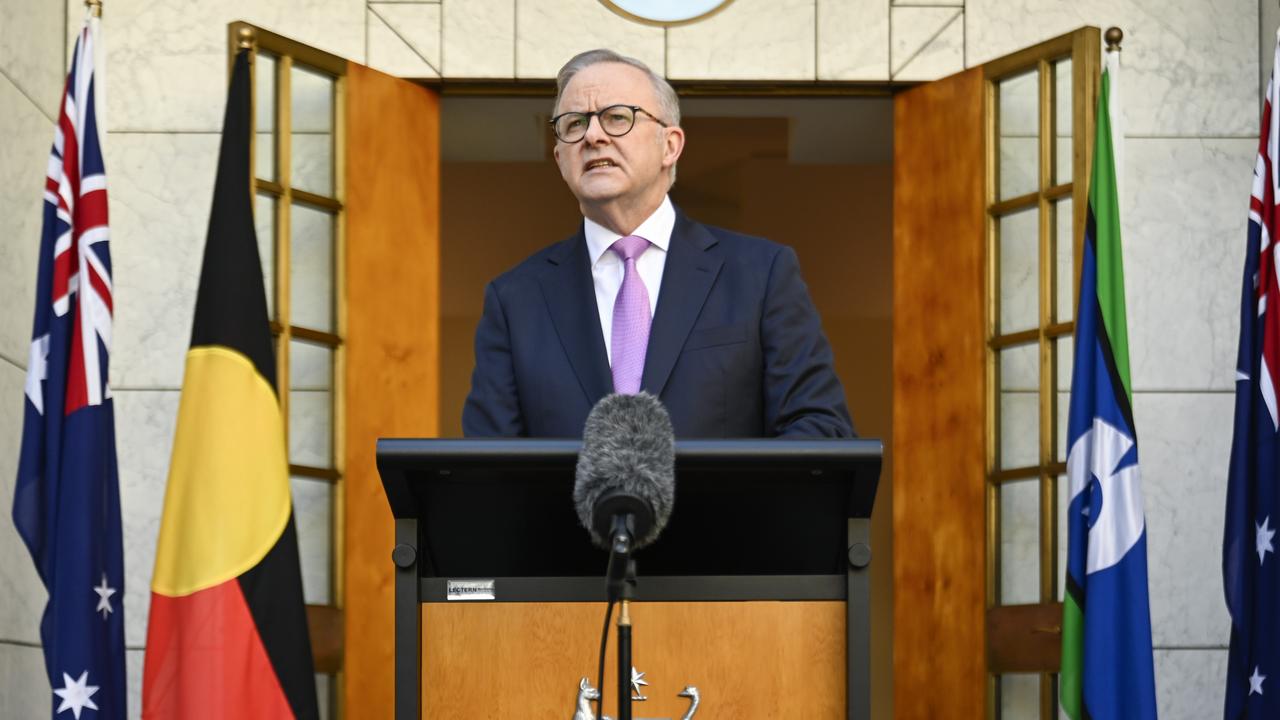Anthony Albanese gives free kick to unions on free trade
Union demands for new legislated rules dictating how free trade agreements are negotiated will be considered by a parliamentary inquiry.

Union demands for legislated rules dictating how free-trade agreements are negotiated will be considered by a parliamentary inquiry, after Anthony Albanese delivered another concession to Left-faction bosses ahead of next week’s ALP national conference.
Moving to avoid a national conference ambush, Trade Minister Don Farrell on Thursday unveiled a joint parliamentary inquiry tasked with developing negotiation frameworks on free-trade agreements and investment deals that focus more on workers, business and the national interest.
Union leaders, who have historically opposed free-trade agreements that they claim fail to support working people and undermine jobs, will endorse a raft of recommendations in the ALP policy platform that could put existing and new free-trade deals at risk.
The parliamentary inquiry was announced days after the federal Labor caucus endorsed a hard-line position on Israel to appease Left-faction powerbrokers, who will command a majority of votes on the floor of the 49th national conference.
Senior ALP figures will remain locked in negotiations with union leaders and delegates until the conference begins on Thursday to ensure the government isn’t embarrassed over motions related to AUKUS, Palestine, economic policies, climate change and trade.
The ALP draft platform, which will be debated over three days at the first in-person national conference since late-2018, says “Labor will legislate a clear framework for the negotiation and ratification of future trade agreements”.
“This framework will set out the parameters for negotiating mandates for these agreements … as well as promoting transparency through clear consultation and reporting requirements. Labor will seek renegotiation of existing trade agreements that do not meet these requirements,” it says.
Senator Farrell last year delivered a win for unions after committing to excluding investor-state dispute settlement (ISDS) clauses in future FTAs. The unions will push for them to be removed from existing FTAs.
According to the Department of Foreign Affairs and Trade, Australia has ISDS provisions in 10 FTAs, including the CPTPP, China, Korea, Chile, Singapore, Thailand, ASEAN/New Zealand, Peru, Hong Kong and Indonesia trade deals. The ISDS clause allows a foreign investor in Australia or an Australian investing overseas to seek compensation for “certain breaches of a country’s investment obligations”.
An ISDS tribunal can’t overturn domestic laws and regulation and is limited in determining breaches of investment obligations. DFAT says ISDS, which cover property, denial of justice and shifting capital, “does not give foreign investors the right to enforce other provisions” of an FTA.
The ALP platform heaps pressure on the Albanese government to negotiate with trade partners to remove ISDS provisions from existing deals.
“Labor will task (DFAT) to commence negotiating the removal of these clauses and the reinstatement of labour market testing where it has been waived to ensure those agreements are consistent with Australian laws and regulations.”
“Labor will review ISDS provisions in existing trade and investment agreements and seek
to work with Australia’s trading partners to remove these provisions. While this process is
underway, Labor will work with the international community to reform ISDS tribunals, so
they remove perceived conflicts of interest by temporary appointed judges.
Senator Farrell said the parliamentary inquiry would ensure that the “benefits of trade must be shared across the whole community … this starts with how we involve the community and business in how we negotiate these agreements”.
The Joint Standing Committee on Trade and Investment Growth inquiry will consider the “priorities for, states and territory governments, businesses, workers and other relevant stakeholders” under a negotiating mandate.
It will make recommendations on negotiating trade and investment agreements, including consultation with representatives of industry and workers, economic, social and environmental impacts, ensuring First Nations Australians can participate and benefit in trade and protecting and advancing the national interest.
Opposition trade spokesman Kevin Hogan attacked the inquiry and said it was established to “fend off the union movement who do not like trade agreements … Only in September last year the CFMEU called for our free-trade agreement with the UK be scrapped.”
The CFMEU was not “generally supportive of free-trade agreements”, Mr Hogan said. “The Coalition backs trade 100 per cent. We realise one in four jobs in Australia is export-related. When we were in government the Coalition lifted the goods and services covered by a free-trade agreement from 28 to 80 per cent – getting access to more customers for our products.”
Backing the parliamentary inquiry, ACTU president Michele O’Neil said the “current system doesn’t deliver enough independent scrutiny of trade deals and just isn’t transparent enough”.
“The benefits of trade must be shared fairly across the whole community, and the voices of working people who are impacted need to be heard,” Ms O’Neil said.
National Farmers Federation president Fiona Simson said she did not “support revisiting and reopening every agreement with ISDS provisions”.
“That’s likely to be a dog’s breakfast, and the effort would be better spent pursuing better market access to diversify our trading partnerships. We have a deal with the EU to hopefully conclude, we’re continuing important discussions with India. We need to keep moving forward and improving our access or we just get left behind,” Ms Simson said.
Ms Simson said the parliamentary inquiry would help “examine the processes for agreement making”.
CFMEU construction division national secretary Zach Smith said unions had been calling for years for a review of how Australia negotiated trade agreements
“Australia’s guiding principle on trade must be ensuring workers and communities are better off from these deals. For too long the interests of big business have trumped workers during trade talks. Those misguided priorities need to be realigned so our economic decisions work for society,” Mr Smith said.
Electrical Trades Union national secretary Michael Wright said “so-called free-trade agreements have consistently sold Australian workers down the river”.
“If the ETU had not raised the alarm about the China free trade agreement, the trade and license of electricians would have been gutted,” he said.
“We welcome this review, especially its emphasis on the economic, social and environmental impacts of trade agreements and the focus on national and public interest. We must stop sacrificing sovereignty on the altar of economic orthodoxy.”
Australian Workers Union national secretary Paul Farrow said there should be a strong focus by the inquiry on whether free-trade agreements created and supported a level playing field for Australian manufacturers.
“Free trade agreements are not inherently good, they’re only worthwhile if they serve the interests of everyday Australians,” he said. “The previous Coalition government was happy to sign FTAs that sold out Australian workers to serve the interests of big business.”
Former Coalition trade minister Andrew Robb ratified the South Korea trade deal shortly after the 2013 election because the agreement had virtually been negotiated by former Labor trade minister Craig Emerson. The deal was stalled after union pushback over ISDS provisions.
Australian Industry Group chief executive Innes Willox said it was useful to assess how to approach future free-trade agreements as the benefits were “potentially becoming increasingly marginal and divergent from core trade issues”.
“As we get to the point of renegotiating and updating FTAs, a source of continued frustration for business is that other countries share more negotiation text with stakeholders during negotiations than Australia has done to date. The negotiations are unnecessarily opaque and often overlook that it is business that implements the outcomes,” Mr Willox said.




To join the conversation, please log in. Don't have an account? Register
Join the conversation, you are commenting as Logout